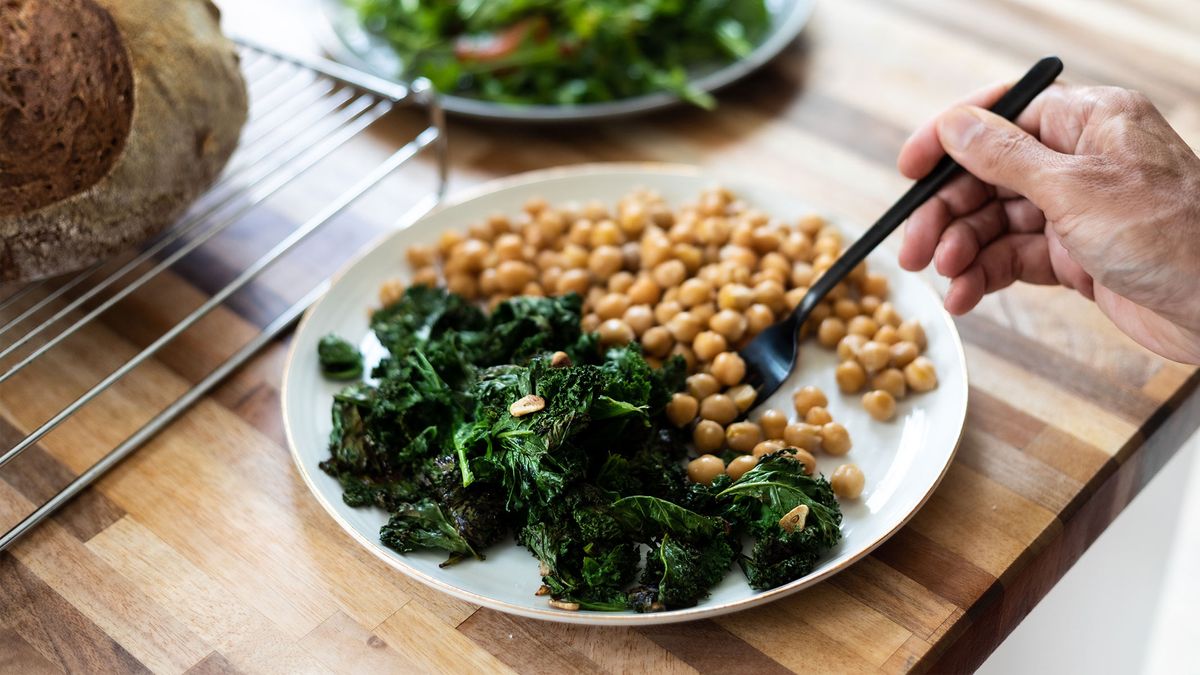Leafy green vegetables are packed with nutrients such as fiber, vitamins, minerals and antioxidants — but the verdant veggies can interfere with some medications, such as warfarin, used to prevent blood clots.
Why do leafy greens interact with these medications?
It comes down to the high vitamin K content in leafy green vegetables, Joan Salge Blake, a nutrition professor and registered dietitian nutritionist at Boston University, told Live Science in an email. Many vegetables — like kale, spinach, collard greens, Swiss chard, cabbage, endive, broccoli and Brussels sprouts — are especially rich in vitamin K, containing more than 100 micrograms per serving.
One reason vitamin K is important is that the body uses it to make clotting factors, which are proteins required for a blood clot to form, Salge Blake said. Blood clotting is part of the body’s automatic response to injury and helps to prevent excessive blood loss.
“Without vitamin K, a simple cut on your finger would cause uncontrollable bleeding,” Salge Blake said.
Related: How does grapefruit interact with drugs?
But in some cases, blood clots form spontaneously, when there isn’t an acute injury. When these clots appear in the arteries or veins, they can block blood flow to the heart, brain, lungs and other organs. These clots can lead to life-threatening conditions, like a heart attack, stroke or pulmonary embolism, in which bits of a clot break off and travel to the lungs.
To lower the risk of blood clots in people with certain medical conditions, such as atrial fibrillation, doctors prescribe anticoagulant medications, also known as blood thinners. A commonly prescribed anticoagulant is warfarin (brand name: Coumadin). Warfarin works by blocking an enzyme that activates vitamin K. With less active vitamin K available, fewer clotting factors are released and blood clots form more slowly.
When a person on warfarin suddenly increases their intake of vitamin-K-rich foods, like leafy green vegetables, this boost in the vitamin can counteract the effects of the drug. This ultimately makes the treatment less effective and allows the blood to clot too easily.
Does this mean that people on warfarin should avoid leafy green vegetables? Not necessarily. If the amount of vitamin K in a person’s diet suddenly drops really low, warfarin can become too effective, increasing the risk of excessive bleeding.
So what’s the solution? The key to preventing fluctuations in warfarin’s effectiveness is to maintain a consistent intake of vitamin K, Salge Blake said.
“Eating more or less leafy green vegetables than usual from week to week will make warfarin’s clotting effect difficult to predict, which will in turn affect the clotting and bleeding in the body,” Anastasiya Shor, an assistant professor at Touro College of Pharmacy in New York, told Live Science in an email.
Some leafy greens contain more vitamin K than others. For example, lettuce, asparagus and okra contain 30 to 75 micrograms (mcg) of vitamin K per serving, whereas a serving of spinach or kale contains more than 150 mcg.
People on blood thinners can still aim for the recommended amount of vitamin K in their diet, but should “keep the sources of vitamin K in their diet similar from week to week to make sure that the effect of the warfarin medication stays consistent in the body,” Shor said.
To avoid interactions between leafy green vegetables and blood thinners, people taking such medications should discuss their diet and any changes in their weekly vitamin K intake with their health care providers, Shor said.
“It’s a team effort with the patient, registered dietitian nutritionist, and doctor all working together for the best health outcome,” Salge Blake said. (Newer blood thinners, as well as older ones like aspirin, work by a different mechanism and do not have this interaction.)
This article is for informational purposes only and is not meant to offer medical advice.
Ever wonder why some people build muscle more easily than others or why freckles come out in the sun? Send us your questions about how the human body works to community@livescience.com with the subject line “Health Desk Q,” and you may see your question answered on the website!
